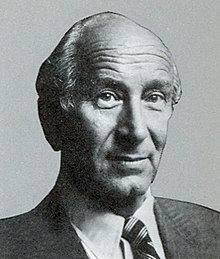James H. Weaver
| James H. Weaver | |
|---|---|

January 1983 Congressional Photo
|
|
| Member of the U.S. House of Representatives from Oregon's 4th district |
|
|
In office January 3, 1975 – January 3, 1987 |
|
| Preceded by | John Dellenback |
| Succeeded by | Peter DeFazio |
| Personal details | |
| Born |
August 8, 1927 Brookings, South Dakota |
| Political party | Democratic |
James Howard "Jim" Weaver (born August 8, 1927) is a former Democratic U.S. congressman from Oregon.
Weaver enlisted in the United States Navy at the age of seventeen and served in World War II on an aircraft carrier in the Pacific. Weaver moved to Oregon from Iowa, in 1947 to attend the University of Oregon.
Prior to entering Congress, Weaver worked for a publishing company. In 1959, he was hired as a staff member for the Oregon Department of Agriculture. In 1960, Weaver was hired by a real estate development company, eventually becoming a developer of apartment and office buildings. He was a delegate to the 1960 and 1964 Democratic National Conventions.
In 1974, Weaver defeated incumbent Republican congressman John R. Dellenback to become the United States Representative from Oregon's 4th congressional district. Weaver's victory over the moderate Dellenback is attributed at least in part to the anti-Republican sentiment among voters in the wake of the Watergate scandal. Weaver served six terms in the House, where he was known for his opposition to the Vietnam War, pro-environmental views, and opposition to the proliferation of nuclear power plants. In 1980, Weaver was also the first recipient of campaign contributions from the newly established Human Rights Campaign.
He was also well known for conducting the only filibuster in the modern history of the House of Representatives by adding 113 amendments to a Washington Public Power Supply System bill in 1980. After the filibuster, the House passed "The Weaver Rule" to "limit" the use of such tactics.
...
Wikipedia
